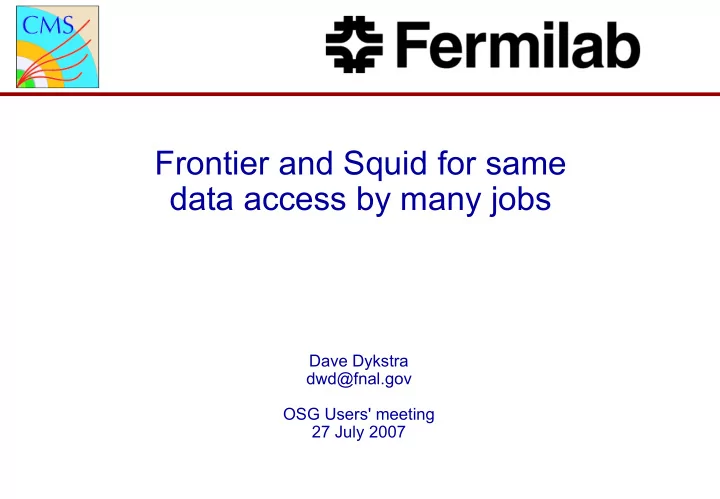

Frontier and Squid for same data access by many jobs Dave Dykstra dwd@fnal.gov OSG Users' meeting 27 July 2007
The problem Some applications need to get the same data to many jobs on a compute cluster Inefficient or impractical to initially send with the job Data too large or too many jobs for all to retrieve over a WAN directly from the source Sometimes too much even for a single LAN source
The Frontier+Squid solution Distributes rarely-changing data from central databases to many clients around the world Many sites Many nodes/jobs at each site using same data Transfers with http to take advantage of standard tools Uses squid to cache centrally and locally at each site also add-on monitoring tools MRTG and awstats Name comes from “N-tier” Developed for CDF at Fermilab Being adapted for CMS at CERN (by Fermilab)
Frontier architecture LAN WAN LAN http Application & Tier>=1 Site 1 frontier_client squid ... Central server frontier SQL Site 2 http Application & http http servlet/ DB Tier>=1 Tier 0 frontier_client tomcat squid ... squid ... http Application & Site N Tier>=1 frontier_client ... squid
Frontier/Squid performance Not designed for fast cache loading – 7MB/s or less to load from Oracle DB through tomcat servlet Can compress data: slows cache loading, speeds network Adds 1/3 net overhead for hex encoding to fit into http/xml Performs well for multiple clients once data is locally cached, especially for objects a couple megabytes or larger 430MB/s total throughput for 2 squid servers each with 2 bonded gigabit interfaces and 2 squids However, that may not be enough for many jobs or large datasets that are loaded at nearly the same time 100MB * 1000 jobs / 430MB/s = ~4 minutes 10GB * 100 jobs / 430MB/s = ~40 minutes
Starting many jobs at once - problem CMS has an “Online” application with tight requirements: All nodes start same application at the same time Pre-loading data must be < 1 minute Loading data to jobs must be < 10 seconds Estimating 100MB of data, 2000 nodes, 8 jobs/node 100 * 2000 * 8 = 1.6TB Asymmetrical network Nodes organized in 50 racks of 40 nodes each non-blocking gigabit intra-rack, gigabit inter-rack
Starting many jobs at once - solution Solution for CMS Online: squid on every node Configured to pre-load simultaneously in tiers Each squid feeding 4 means 6 tiers for 2000 nodes 50 racks reached in 3 tiers, 3 tiers inside each rack Measurements on test cluster indicate requirements can be met bottleneck becomes the conversion from DB to http 10-second loading always reads from pre-filled local squid
Grid environment Much less controlled than CMS Online, but still may need to load same data to many jobs at nearly the same time One non-Frontier case needs 14GB of data, nearly 1GB at a time during a long-running job, hundreds of jobs Must have at least one local cache If all load from same cache, 1GB * 100 nodes / 100MB/s (1 Gbit/s) would be 16+ minutes Many different sites administered by many different people Needs to be easy to configure
Grid environment proposal It's easy to make data available on an http server Proposal: Primary (& possibly secondary) squid at each grid site squid on every grid worker node configured to find primary (& secondary) for site automatic discovery of node peers because static configuration is impractical
Automatic discovery of squid peers squid-users suggested using existing multicast feature to locate objects already cached in peers doesn't scale to hundreds or thousands of nodes Proposal: modify multicast peer discovery as follows only peers that have objects respond only when not heavily loaded keep track of fastest responders and use unicast queries most of the time also keep track of fastest throughput and give them priority to make best use of asymmetrical network use existing TTL limit feature on multicast
Further info Frontier home page: http://frontier.cern.ch/ Performance details on CMS Twiki https://twiki.cern.ch/twiki/bin/view/CMS/FrontierPerformanceImprovements
Recommend
More recommend